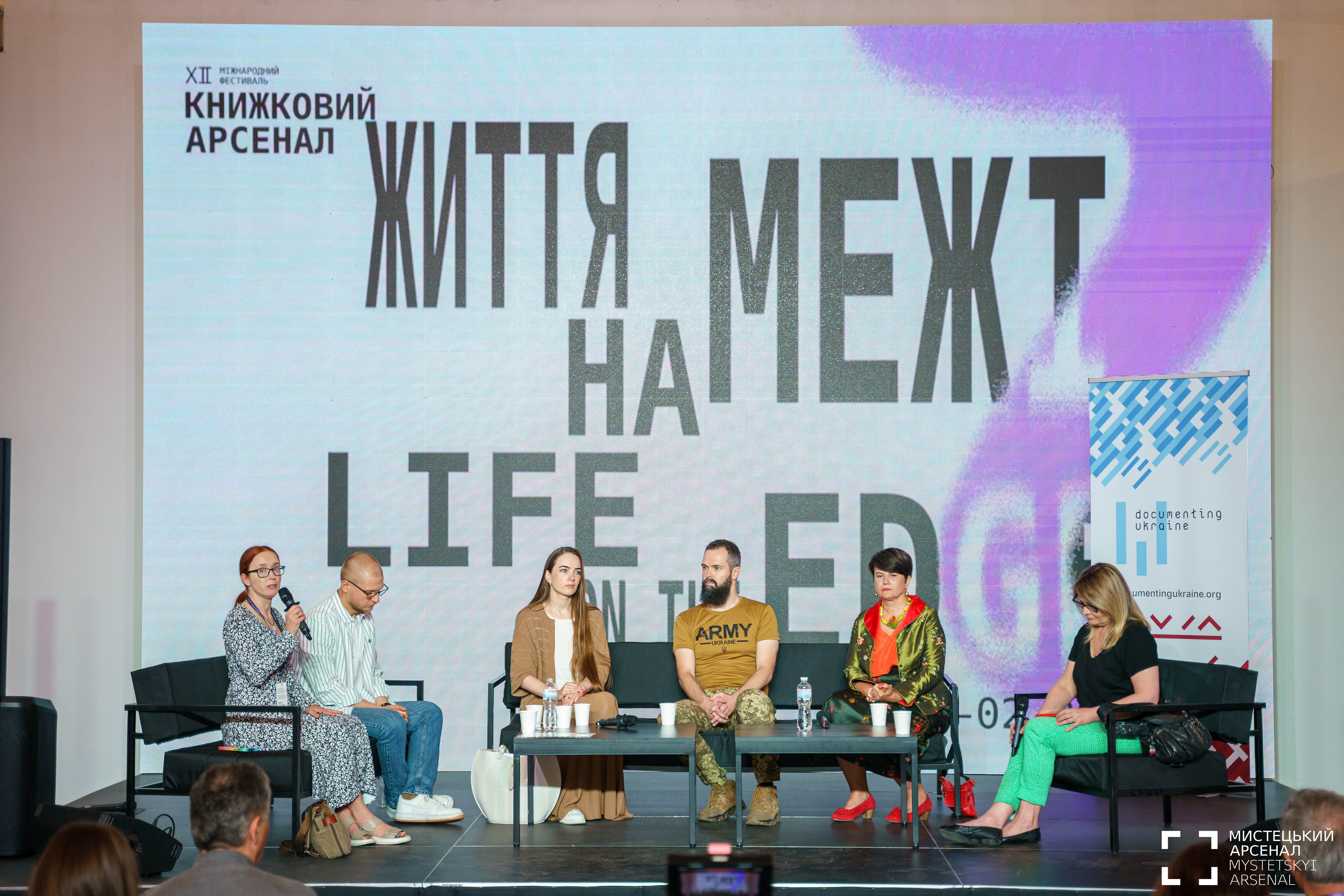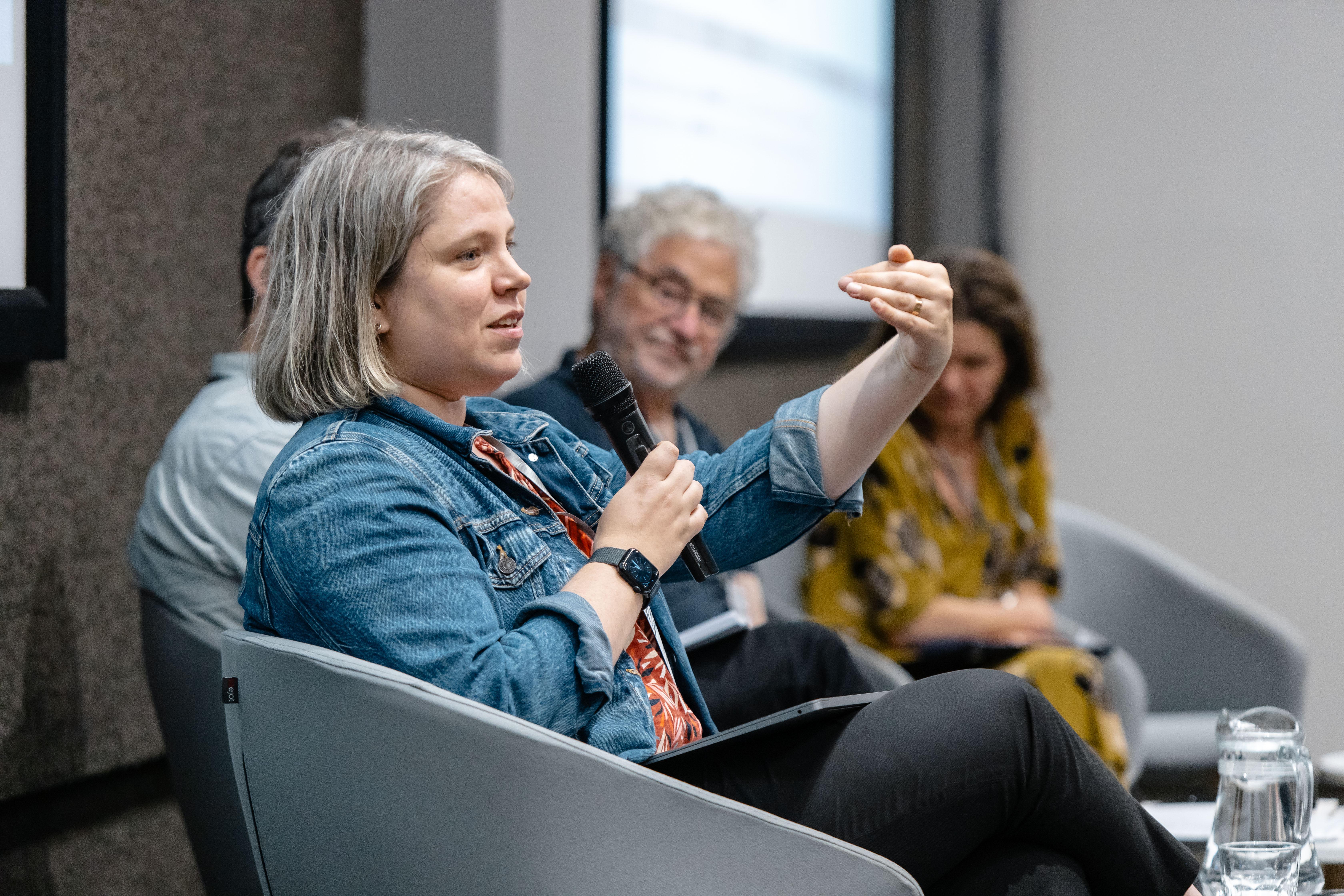In late May and early June, the IWM's Documenting Ukraine program, together with partners within and outside Ukraine, co-organized two significant events that provided space for encounters, exchange, and reflection on the ongoing Russo-Ukrainian war. Life on the Edge and The Most Documented War highlighted the program's dedication to documenting the war and fostering international collaboration.
Life on the Edge at the Book Arsenal

© Art Arsenal/Roman Shalamov
For the second consecutive year, Documenting Ukraine partnered with the Book Arsenal festival in Kyiv to explore the Ukrainian experience during the full-scale Russian invasion. This year's edition, themed Life on the Edge, took place from 30 May to 2 June and was curated by Volodymyr Yermolenko and Tetyana Ogarkova.
During the opening ceremony, Yermolenko and Ogarkova discussed the concept of the edge in geographical, existential, and geopolitical terms. The remnants of books from the recently destroyed Faktor Druk printing house in Kharkiv were displayed near the main stage, underscoring the cultural dimension of the war.
Key discussions included The Edge within Us, where Nobel laureate Oleksandra Matviichuk and writer Olena Stiazhkina reflected on cruelty, solidarity, and living in liminal spaces since the occupation of Donetsk.
Another highlight was Being a Military Man/Woman Today, featuring writers and journalists who joined the army and discussed reconnecting with their civilian pasts through literature. Poet Artur Dron and author Dmytro Lazutkin shared their favorite reads, while journalist Dmytro Krapyvenko noted reading as both escapism and self-education.
The Art of Resistance Beyond the Edge explored non-violent resistance with photographer Li Biletska and Ukraïner founder Bohdan Logvynenko, among others, where the panelists discussed artistic resistance and the personal stakes of complying with occupation rules.
The festival concluded with reflections on Ukraine’s geopolitical position in Frontier or Center? Ukraine's Role in the World and The End of Empires, where scholars debated Russia’s colonial strategies, the global re-centering towards Asia, and the future of Russia as an imperial power.
Read the full event report here.
Lessons in International Collaboration from The Most Documented War Symposium

© Center for Urban History/Bohdan Yemets
The Most Documented War symposium, launched in 2023 as a collaborative effort between Documenting Ukraine, the Center for Urban History in Lviv, and the University of St. Gallen, continued its exploration of sustainable archival infrastructures for the Russo-Ukrainian war. This year’s symposium focused on the collaborative elements of archiving and documentation, addressing mobility challenges, legal and administrative differences, and the emotional labor involved.
The opening panel, Cool Head, Warm Heart: The Language of Emotions and Knowledge Production, foregrounded the role of emotions in documenting the war. Journalist Mariana Matveichuk shared her experiences working with foreign colleagues, emphasizing the importance of ethical boundaries. Sociologist Anna Wylegała discussed her positionality as a Polish researcher working on a project about war-stricken Ukraine and the emotional labor required in her work, while Journalist Terrell Jermaine Starr spoke about reporting on Ukraine for an American audience, particularly Black Americans, and the need for a broader understanding of colonialism.
How Far Can You Go: Everyday Geographies in Documentation examined the role of borders and physical bodies in documentation. Speakers discussed the new inequalities and opportunities for building trust through geographical knowledge. Andrii Usach from the NGO After Silence shared insights on international collaboration frameworks and the perception of Ukrainians as equals in the knowledge production process.
International experts discussed maximizing resource flows and ethical considerations in crisis times on the panel Beyond Recourcification: Flows of Data, Finances and Knowledge. Among other insights, participants emphasized the importance of personal relations and using Western resources to support underrepresented researchers.
A panel entitled Servers and Clouds in 50 Years: Documentation Technologies Today and the Sustainability of Archives focused on the use of technology for sustainable archiving. Discussions covered digital materials processing, the impact of AI-generated data, and the collaboration between historians and archivists.
The legal aspects of war documentation were addressed in From De Iure to De Facto: Legal Dimension of War Documenting, which covered the ethical handling of personal information and mechanisms for bringing justice to victims of war crimes.
Origins and Destinations: Decision-Making and the Possibility of Solidarity highlighted the need to rethink relationships between Western institutions and Ukraine and emphasized the importance of Ukrainians speaking on international platforms.
The symposium also included workshops on visual documentation, data sharing ethics, and challenges of interviewing and culminated in the launch of the book series Stories of War: A Series on Documenting and Archiving, initiated by the Center for Urban History and INDEX: Institute for Documentation and Exchange.
